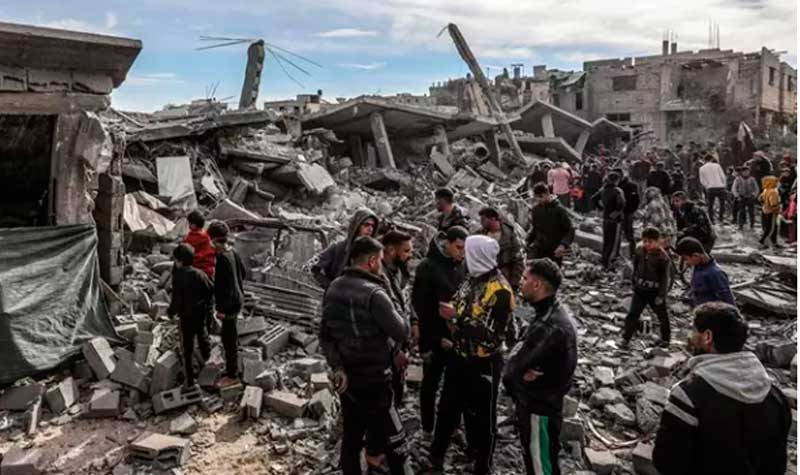Archive image of the collapse of several buildings as part of the Israeli offensive in Rafá. – Abed Rahim Khatib/dpa
BRUSELAS, 16 Feb. (EUROPA PRESS) –
The Foreign Ministers of the European Union will debate this Monday the crisis in Gaza, with growing concern about the “catastrophe” that the Israeli offensive in Rafa could unleash, and after the request of Spain and Ireland to act against Israel based on the Council of Association that governs relations between the bloc and Tel Aviv.
At a time of maximum concern about the situation in Rafá, where 1.3 million displaced Palestinians from across the Strip are concentrated, the 27 meet following the letter from the President of the Government, Pedro Sánchez, and the Irish Prime Minister, Leo Varadkar. , for the European Commission to review the agreement with Israel to investigate whether its essential points in terms of Human Rights are being met.
The suspension of the Association Agreement, the framework that governs relations between the EU and Israel, is in the hands of the Member States once it is proposed by the High Representative for Foreign Policy, Josep Borrell, or by the Community Executive itself, and its total suspension requires unanimity, while partial issues such as suspending commercial aspects would require a qualified majority.
Beyond a vote between European partners that now seems unlikely, diplomatic sources point out that the initiative seeks to spur the debate and get Israel to allow humanitarian aid to the Strip, to end the attacks on Gazan civilians and to ensure that the EU has a voice and a role to play in this conflict.
The step by Spain and Ireland is part of the debate at 27 ahead of the leaders’ summit in March, which will be focused on foreign policy issues, and in which the bloc wants to reformulate its position regarding the war in Gaza. Punitive measures against radical Israeli settlers involved in episodes of violence in the West Bank are also entrenched, sanctions blocked by Hungary and the Czech Republic, and to which Borrell hopes that the Foreign Ministers will give a “political push” during the meeting.
REACTION TO NAVALNI’S DEATH
In addition, the news of the death of the Russian opponent Alexei Navalni has shaken the European bloc and Monday’s meeting in Brussels will be the first opportunity in which the foreign officials of the 27 countries display a common front before Moscow and put new measures on the table. against the Russian regime for this case.
The EU has directly pointed out the Russian president, Vladimir Putin, as responsible for the death of Navalny, who was serving a sentence in solitary confinement in a prison in the remote region of Yamalia-Nenetsia and, as a senior EU official has acknowledged, The Twenty-Seven can now open up on Monday to expand the ‘black list’ of those sanctioned for their persecution after their death.
In a message on social networks, the EU High Representative for Foreign Policy, Josep Borrell, referred to Navalni as “a very brave man who dedicated his life to saving the honor of Russia, giving hope to democrats and society.” civil” and has assured that, in the absence of more information, this case “is the exclusive responsibility of Putin.”
Along the same lines, the deputy secretary general of the Foreign Action Service, Enrique Mora, has stated in a meeting with journalists that the dissident has been “slowly murdered” by Putin, who he has said has “killed all his political adversaries.” .
Likewise, EU countries are working to approve the 13th round of sanctions against Moscow for the military aggression against Ukraine, a package that is already very advanced in the technical groups and that, once it overcomes some reluctance from Hungary, should see the light. at the end of next week coinciding with the second anniversary of the attack launched by Putin against the neighboring country.
In this case, the proposal is to extend the sanctions to some 250 people responsible for the invasion and add more companies that contribute to the war of aggression, especially entities related to the drones that Moscow uses against Ukraine.
It will also be added to the sanctions on “some” foreign companies that make it easier for Russia to evade European sanctions, one of the most controversial aspects of the EU measures since it involves singling out companies from third countries.
Post Views: 1.096
#European #Union #countries #debate #war #Gaza #Monday #request #Spain #Ireland #act #Israel
– 2024-05-13 16:21:41

